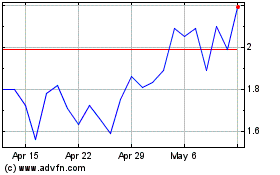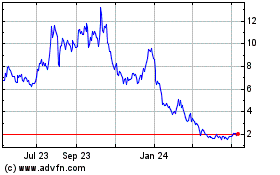WeightWatchers Unveils “Beyond Hunger: Understanding Food Noise” Report Offering Insights Into the Experience of Ongoing, Intrusive Thoughts About Food
January 16 2024 - 9:16AM

WeightWatchers (NASDAQ: WW), (“WeightWatchers,” “WW,” or the
“Company”) today announced the findings of its “Beyond Hunger:
Understanding Food Noise” report focusing on people living with
overweight or obesity and their experience of constant rumination
about food, known as “food noise.” In partnership with STOP Obesity
Alliance at George Washington University’s Redstone Global Center
for Prevention and Wellness, the study reveals a deeper
understanding of food noise, which may reflect a biological
contribution to obesity, and brings it to the forefront of the
cultural conversation around weight bias, GLP-1 medications, and
Weight Health.
“The difference between food noise being problematic or not
comes down to how often and how intensely it’s occurring. Food
noise that occurs daily can be so intense and intrusive that it
negatively impacts food choices and quality of life,” said
Dr. Spencer Nadolsky, obesity and lipid specialist
physician and medical director, WeightWatchers. “With
constant, intrusive thoughts about food, it’s difficult to navigate
behavioral change without clinical help. The first step towards
relief and greater empathy for those living with obesity is
acknowledging that food noise is a real biological issue that many
are facing.”
Once the term food noise was explained to those surveyed as
“constant, intrusive thoughts about food that are disruptive to
daily life and make healthful behaviors extremely difficult,”
57% of people living with overweight or obesity
say they’ve experienced it; still, only 12% had
been familiar with the term. While food noise is universal and
can be experienced by anyone, the intensity can vary from person to
person. For many living with overweight or obesity, thoughts of
food can become confounding, with 65% stating they
fight the urge to eat even though they aren’t hungry.
Food noise can be a significant roadblock to weight health, with
61% of people living with overweight or obesity
saying that food noise makes it difficult to stick to a nutrition
or exercise plan. Yet, because of the depth of weight-related
stigma, food noise is often ignored as a contributing factor to
obesity. 83% of people living with overweight or
obesity judge themselves for their weight. Additionally,
57% of those not living with overweight or obesity
feel that those who are do not take care of themselves.
And with the rise of GLP-1 medications, weight stigma is
persisting in new forms. One in four living with
overweight or obesity report they avoid talking to friends, family,
and doctors about weight loss medications for fear of judgment.
47% of those not living with overweight or obesity
agree that GLP-1 users are just taking the easy way out.
Additionally, 48% think that people using GLP-1s
for weight management are taking them away from those who "really"
need them, and 59% have more respect for those
losing weight without medications.
However, those on GLP-1 medications have found the lack of
all-consuming food-related thoughts allows them to accomplish their
goals better, showcasing that the medications can cause a dramatic
reduction in food noise. 76% of GLP-1 users find
it easier to pick healthier food options, and 72%
find it easier to stick to their nutrition and exercise plans for
weight loss.
Understanding the concept of food noise can help change harmful
perceptions of those living with overweight and obesity as well as
those taking GLP-1 medications to manage their obesity. After
learning about food noise, the notion that GLP-1s are a tool for
managing a chronic condition (obesity) vs. an easy way out
increased by 23% among those not living with
overweight or obesity.
“As our understanding of the challenge of living with obesity
continues to grow, the recognition of food noise provides a new
insight into why a preoccupation with food may be hard wired, and
is not simply caused by a lack of willpower," said William
Dietz, MD, Ph.D., Director, STOP Obesity Alliance. “This
first-of-its-kind consumer research truly helps define this
concept, allowing us to better educate people living with obesity
and others in a way that drives greater understanding, compassion
and ultimately reduces stigma.”
Methodology: The “Beyond Hunger: Understanding
Food Noise” report was developed on behalf of WeightWatchers and
the STOP Obesity Alliance at George Washington University. The
survey was done online among 1,174 Americans living in diverse
bodies. 264 of those surveyed have a BMI of under 25 (not living
with overweight or obesity), 284 have a BMI of 25 - 29 (living with
overweight), and 454 have a BMI of 30+(living with obesity). 295 of
all those surveyed were using GLP-1 medications.
About WW International, Inc.WeightWatchers is a
human-centric technology company powered by our proven,
science-based, clinically effective weight loss and weight
management programs. For six decades, we have inspired millions of
people to adopt healthy habits for real life. We combine technology
and community to help members reach and sustain their goals on our
programs. To learn more about the WeightWatchers approach to
healthy living, please visit ww.com. For more information about our
global business, visit our corporate website at
corporate.ww.com.
About STOP Obesity Alliance:The Strategies to
Overcome and Prevent (STOP) Obesity Alliance is made up of a
diverse group of business, consumer, government, advocacy, and
health organizations dedicated to reversing the obesity epidemic in
the United States. Drawing on the strengths of the collaborative,
STOP conducts research, makes policy recommendations, and develops
hands-on tools for providers, advocacy groups, policymakers, and
consumers. Learn more at stop.publichealth.gwu.edu.
For more information, contact:
Media:
Kelsey Merkel
kelsey.merkel@ww.com
Investors:
Corey Kinger
corey.kinger@ww.com
WW (NASDAQ:WW)
Historical Stock Chart
From Mar 2024 to Apr 2024

WW (NASDAQ:WW)
Historical Stock Chart
From Apr 2023 to Apr 2024
